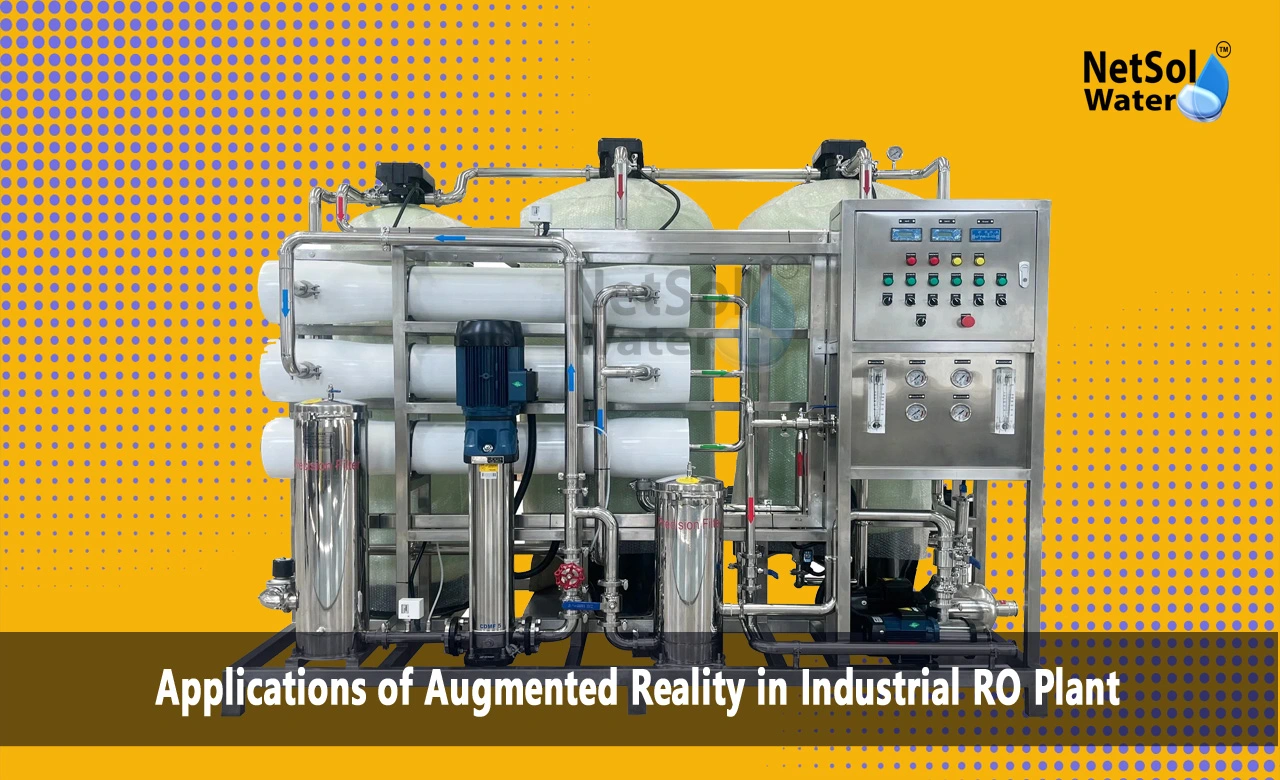Applications of Augmented Reality (AR) in Industrial RO Plant
Industrial RO plants serve as crucial components in various sectors, providing purified water for diverse applications. To optimize efficiency and streamline operations in these complex environments, Augmented Reality (AR) emerges as a transformative technology. By overlaying digital information onto the physical world, AR enhances visualization, training, maintenance, and troubleshooting processes within industrial RO plants. This comprehensive blog explains the diverse applications of AR, showcasing its potential to revolutionize industrial RO plant operations.
Applications of Augmented Reality (AR)
Enhanced Training and Onboarding:
AR facilitates immersive training experiences for operators and maintenance personnel within industrial RO plants. By overlaying interactive digital content onto physical equipment and surroundings, AR-based training modules provide hands-on learning opportunities in a controlled virtual environment. Operators can familiarize themselves with the layout, functionality, and operation of RO systems, learning to navigate complex processes and troubleshoot potential issues effectively. This interactive training approach accelerates the onboarding process for new employees, reduces training costs, and enhances knowledge retention, ensuring a skilled workforce capable of optimizing industrial RO plant performance.
Real-Time Performance Monitoring:
AR-enabled devices, such as smart glasses or headsets, empower operators to monitor the performance of industrial RO plants in real-time. Through augmented displays, operators can visualize key performance metrics, process parameters, and equipment status overlaid onto their field of view. This real-time monitoring capability enables operators to identify anomalies, deviations, or potential equipment failures promptly, facilitating proactive intervention to prevent downtime and optimize system efficiency. By leveraging AR for performance monitoring, industrial RO plants can achieve higher levels of reliability, productivity, and operational excellence.
Interactive Maintenance and Repairs:
AR transforms maintenance and repair processes within industrial RO plants, enhancing efficiency and accuracy while minimizing downtime. Maintenance technicians equipped with AR-enabled devices can access digital overlays containing step-by-step instructions, schematics, and interactive guides for equipment inspection, troubleshooting, and repair tasks. These digital overlays can highlight components, indicateoptimal tool usage, and provide real-time feedback, empowering technicians to perform tasks with precision and confidence. Additionally, AR-based remote assistance capabilities allow experts to provide guidance and support to onsite personnel, facilitating collaborative problem-solving and reducing the need for costly travel or extended downtime.
Spatial Planning and Design Optimization:
AR technology facilitates spatial planning and design optimization for industrial RO plant layouts and equipment installations. Through augmented reality visualization tools, stakeholders can overlay digital models of RO systems, piping networks, and auxiliary infrastructure onto physical spaces, enabling them to assess spatial requirements, identify potential clashes, and optimize equipment placement for maximum efficiency. This interactive design approach streamlines the planning and implementation phases of industrial RO projects, minimizing costly errors, and ensuring optimalutilization of available resources. Additionally, AR can aid in conducting virtual walkthroughs and simulations, allowing stakeholders to visualize the proposed design in context and make informed decisions regarding modifications or improvements.
Remote Training and Collaboration:
AR enables remote training and collaboration opportunities for personnel involved in industrial RO plant operations and maintenance. By leveraging AR-enabled communication platforms, teams can engage in virtual training sessions, knowledge sharing activities, and collaborative problem-solving exercises from disparate locations. Remote participants can interact with augmented content, share insights, and work together to address complex challenges in real-time. This remote training and collaboration capability enhance flexibility, scalability, and accessibility, particularly in situations where travel or physical presence may be limited or impractical. Furthermore, AR-based remote assistance features facilitate seamless communication between onsite and offsite teams, fostering a culture of continuous learning and knowledge exchange.
Conclusion
Augmented Reality (AR) technology holds immense potential to revolutionize industrial RO plant operations, offering a wide range of applications spanning training, monitoring, maintenance, design, and collaboration. By using AR-enabled devices and platforms, operators, technicians, engineers, and stakeholders can enhance efficiency, productivity, and reliability within industrial RO environments. As AR continues to evolve and become more accessible, its integration into industrial RO plant operations promises to unlock new opportunities for innovation, optimization, and excellence. By welcoming AR technology, industrial RO plants can navigate complex challenges, maximize performance, and achieve sustainable success in an ever-changing landscape.
Do you need an advice or assistance on selecting the best water and waste water treatment unit? We have solutions for all your problems!
Let us know your problem, our experts will make sure that it goes away.
For an assistance or related query,
Call on +91-965-060-8473 Or write us at enquiry@netsolwater.com



